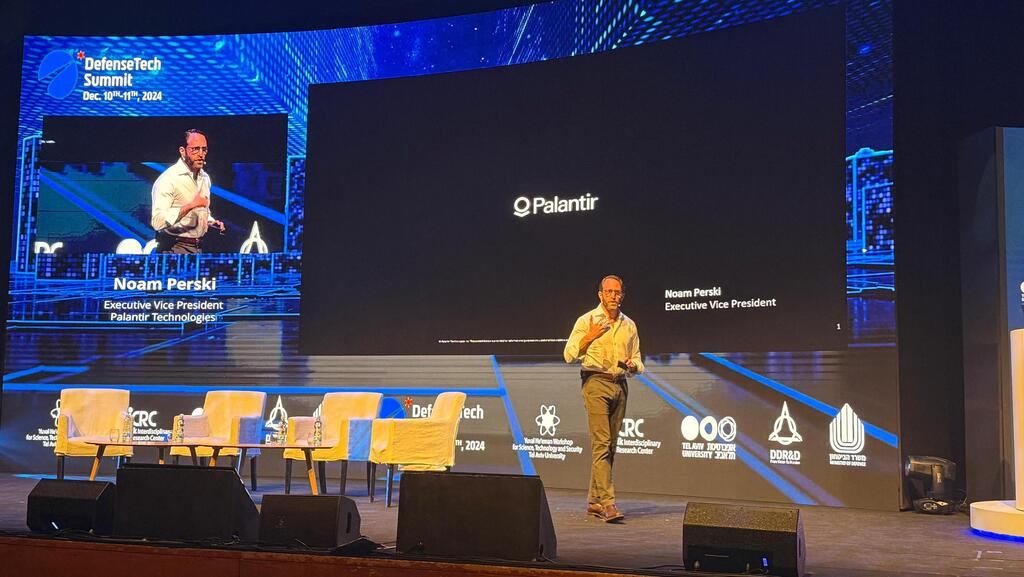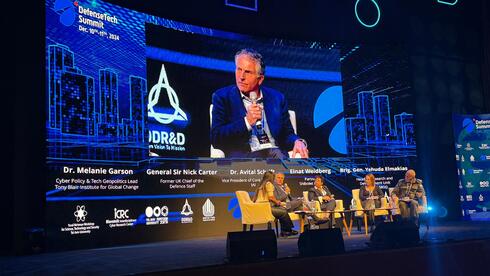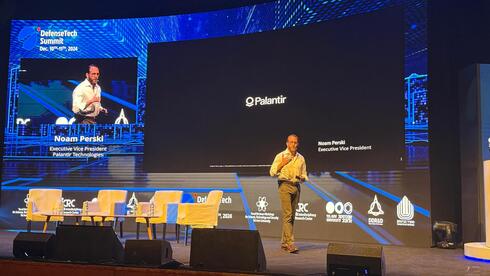
Palantir EVP: "Modern war cannot be won without software"
Noam Perski was speaking at the inaugural DefenseTech Summit in Tel Aviv. For the first time in Israel, a two-day summit was hosted celebrating all things cyber, digital, and war. It was a sign of things to come.
Nothing quite solidifies a sector securely within Startup Nation than a days-long summit celebrating its achievements and potential. For years, industry leaders have traveled to Israel for several ‘Weeks’ - Cyber, AI, and Fintech have all had their time in the spotlight. This week’s DefenseTech Summit, hosted at Tel Aviv University in cooperation with the Tel Aviv Municipality and the Ministry of Foreign Affairs, united CEOs, CISOs, executives, investors, and government officials in what it promised to be the first of many in the years ahead.
“I believe this event will become an annual tradition,” said Maj. Gen. (Res.) Eyal Zamir, Director General, Israel Ministry of Defense in his opening remarks. “Israel is a special place to host this summit. We may be the only nation where security, local industry, innovation, and technology are integrated into daily life.”
DefenseTech has seen a huge boom around the world given the rise of global conflicts seen in Europe and the Middle East. According to Zamir, military expenditure is increasing worldwide with a 113% increase over 22 years, and Israel has increased its Directorate of Defense Research & Development (DDR&D, or “MAFAT” in Hebrew) collaboration with local startups by 63% since the beginning of 2023.
According to data from Crunchbase, sector funding peaked in 2024 with $3 billion of funding across 85 deals. Companies like SpaceX and Palantir can be attributed to the birth of the modern-day defensetech era as the concept of ‘duel-use’ technologies become a relic of the past: Today, it is just ‘use’ technologies that can be a benefit for businesses and governments alike.
“There are no more dual-use technologies. Everything can be defense and can be a civilian application,” said Dr. Avital Schrift, Vice President of Core Technologies at IAI on stage in a panel with Sir Nick Carter, the UK’s Former Chief of the Defence Staff, Einat Weidberg, Partner at Shibolet & Co., and Brig. Gen. Yehuda Elmakias, moderated by Dr. Melanie Garson, Cyber Policy & Tech Geopolitics Lead at the Tony Blair Institute for Global Change. “You can take your microwave oven and look at radar technology, and it's the same,” she added. “So everything is duel use. Whatever you are doing and thinking: it may have the best medical application but it can be used for defense as well, and the other way around.”
DefenseTech Summit 2024 was planned to highlight complex and real-world scenarios, providing lessons from Israel’s technologies and strategies to help address global security challenges. In all, it would help shape the future of defense technology and help position the country as a key player in the industry.
“For the first time in living memory, the free world is confronted by a hostile coalition of authoritarian powers who are actively collaborating to create their own version of a new world order,” said Sir Carter in his remarks titled “Emerging Lessons from the Evolving Character of Conflict in Ukraine and Further Afield in a World that is at War. “These threats blend old elements, competition for resources, territory, and political power, with new approaches… In short, we face an inflection point between the industrial and information ages. It is software, not hardware, that is at the heart of this transformation.”
Related articles:
Expanding on this point was Noam Perski, Executive Vice President at Palantir Technologies who spoke to the crowd on “The New Battlefield” and the shift to software-driven warfare. As one of the leaders in the space, the company is set on preparing how to defend against threats as they happen. “Software doesn't win wars. The willingness of men and women to put their lives on the line, the willingness of parents to put their children in the line of fire, and of leaders to make difficult decisions: These are the things that win wars,” he told the crowd. “But modern war cannot be won without software. Seeing software as a defense system, as a weapon system, and the most malleable weapon system we have, is really important as we build the next generation's capabilities.”
For DefenseTech companies, Perski warned that much like cybersecurity, companies may not always know what they need - only that they will need to adjust to ongoing and ever-changing threats. “You don't know what you’re going to need, so you need to build with that in mind. Build a set of capabilities that lets you get whatever you want. Our view is to use software as a way to stitch everything together. That’s what we are trying to do everywhere in the world, especially here \[in Israel\] with great partners in the industry, great partners in “MAFAT”, great partners in the IDF, and other places. I couldn’t be prouder to be up here talking about all of this, and looking forward to working with all of you to make this a reality here.”


